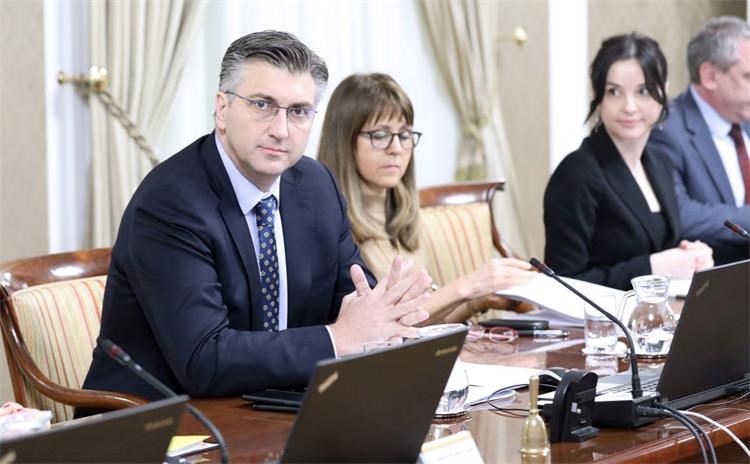


Prime Minister Andrej Plenkovic said on Friday Bleiburg represented a symbol of the gravest human rights violations and the plight of the Croatian people in the 20th century, voicing hope that, in a dialogue between the Croatian and Austrian bishops' conferences, a solution would be found to appropriately commemorate and pray for those killed at Bleiburg at the end of WWII.
"The main goal of observing the Bleiburg tragedy must be commemorating the victims, honouring all those who were killed there without trial or verdict," Plenkovic said at a cabinet meeting. He was commenting on a decision of the Catholic Church in Carinthia not to allow a memorial service for the victims at Bleiburg field in Austria this year.
Plenkovic said the Croatian government condemned the negation of that tragedy as well as attempts to politicise the commemoration or downplay the criminal character of Croatia's WWII Ustasha regime.
"The government takes a completely clear distance from every totalitarianism and supports the policy of nurturing the culture of remembering the broad human rights violations during the 20th century. We are willing to make efforts via the ministry and our embassy and the Austrian public, even in the communication between the churches, without getting involved in their relations, so that appropriate solutions can be found in a constructive fashion."
We have achieved a good consensus on the history curriculum
Plenkovic went on to say that every activity concerning school curricula had been completed and that they were unanimously adopted by experts. "We have achieved a good consensus on the history curriculum, which often causes ideological and not just expert, but also political disputes. The text is ready, the minister will adopt it and it's expected to be published in the Official Gazette in the middle of next week."
Plenkovic said the delicate topics of 20th century history, such as crimes and the Holocaust, were appropriately represented in the history curriculum and that it took a democratic and unbiased stance on every totalitarian and authoritarian system.
He said the history curriculum covered Croatia's 1991-95 Homeland War appropriately and in detail as well as in keeping with the parliamentary Homeland War Declaration. "It's not a political, but an expert document," he said, adding that the whole government could stand by it.
He is confident that the experts who will write textbooks based on the history curriculum will write "good and interesting texts for young people who will leave school with all the fundamental knowledge about Croatian culture, history, language, identity, our tradition, while also being well-informed about the history of Europe, the world and other countries."
Divjak: History curriculum will be published next week
Science and Education Minister Blazenka Divjak said the history curriculum task force had completed its job and that it would be published next week.
"We made it after three rounds of talks. The expanded task force unanimously stood by this curriculum and this is a good sign for Croatia," she told reporters ahead of the cabinet meeting.
Croatia PM reiterates Bosnia security minister's claims nonsense
Croatian Prime Minister Andrej Plenkovic reiterated on Friday that Bosnian Security Minister Dragan Mektic's accusations, that Croatian intelligence agents had been part of a covert operation aimed at showing that armed group of radical Islamists were active in Bosnia and Herzegovina (BiH), were "nonsense" and "manipulation".
Mektic made the accusations on Wednesday, saying the operation was intended to justify Croatian President Kolinda Grabar-Kitarovic's earlier claims that thousands of Islamic extremists in BiH pose a threat to regional security.
Mekis'c statements, "aside from the words 'nonsense', 'manipulation' and 'ill-intentioned claim', deserve no other additional or further comment," Plenkovic said at a cabinet meeting.
"Croatia is a member of NATO and the European Union, a country which, together with other partners, is engaged in the fight against terrorism and, in that respect, will continue to cooperate with all the countries in its neighbourhood, including BiH, in a responsible manner," he added.
Croatia condemns heinous attack in New Zealand
Prime Minister Andrej Plenkovic on Friday condemned in the strongest terms the terror attack at two mosques during Friday prayers in Christchurch, New Zealand.
We condemn the crime and extend our sympathy to the families of the victims and to the authorities of New Zealand, Plenkovic said in Zagreb during his cabinet's meeting, describing the shooting as a heinous attack.
Forty-nine people have been shot dead and 48 injured in attacks at two mosques during Friday prayers in Christchurch, the worst mass shooting in New Zealand’s history.
The prime minister, Jacinda Ardern, said this was “one of New Zealand’s darkest days.”
Text: Hina